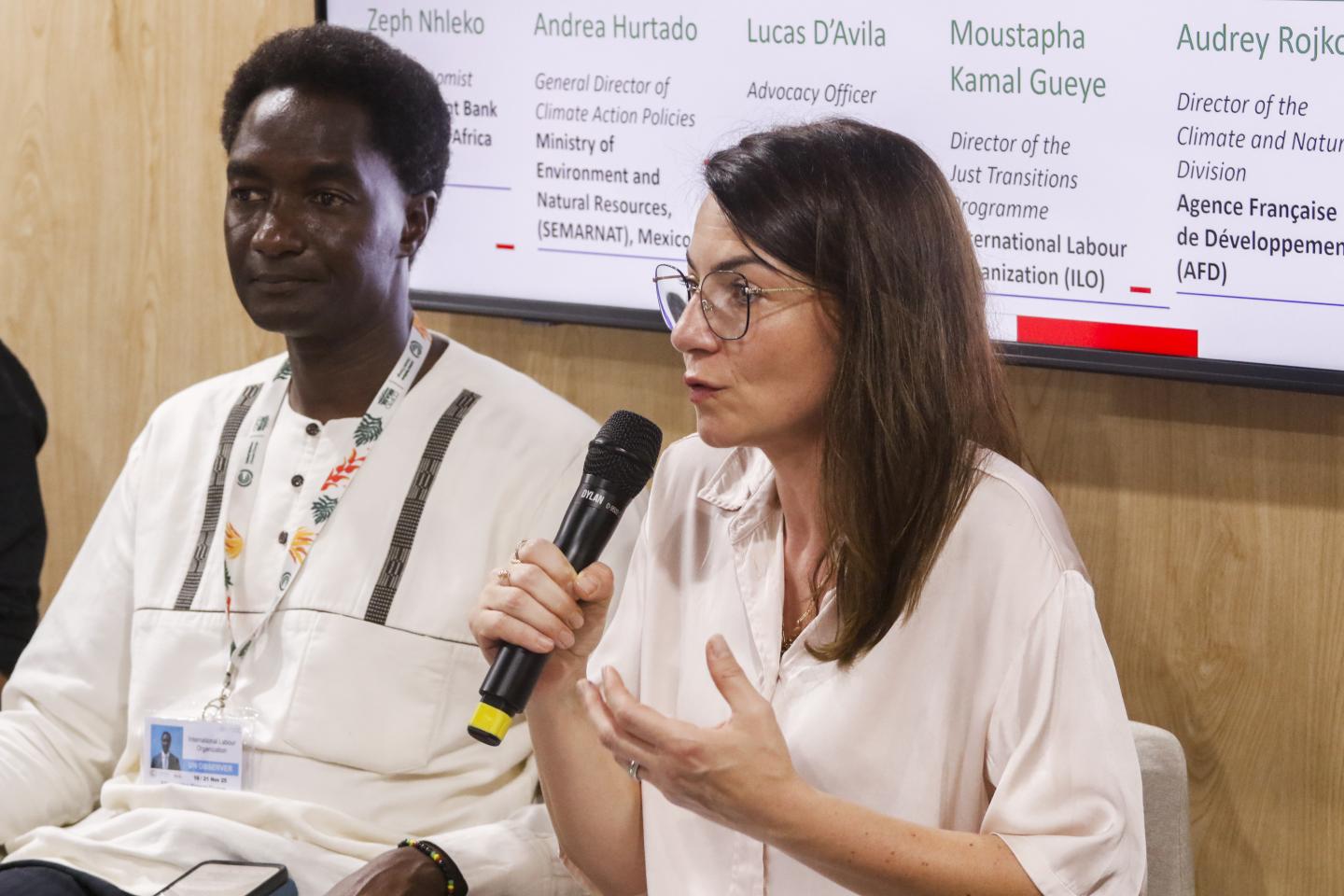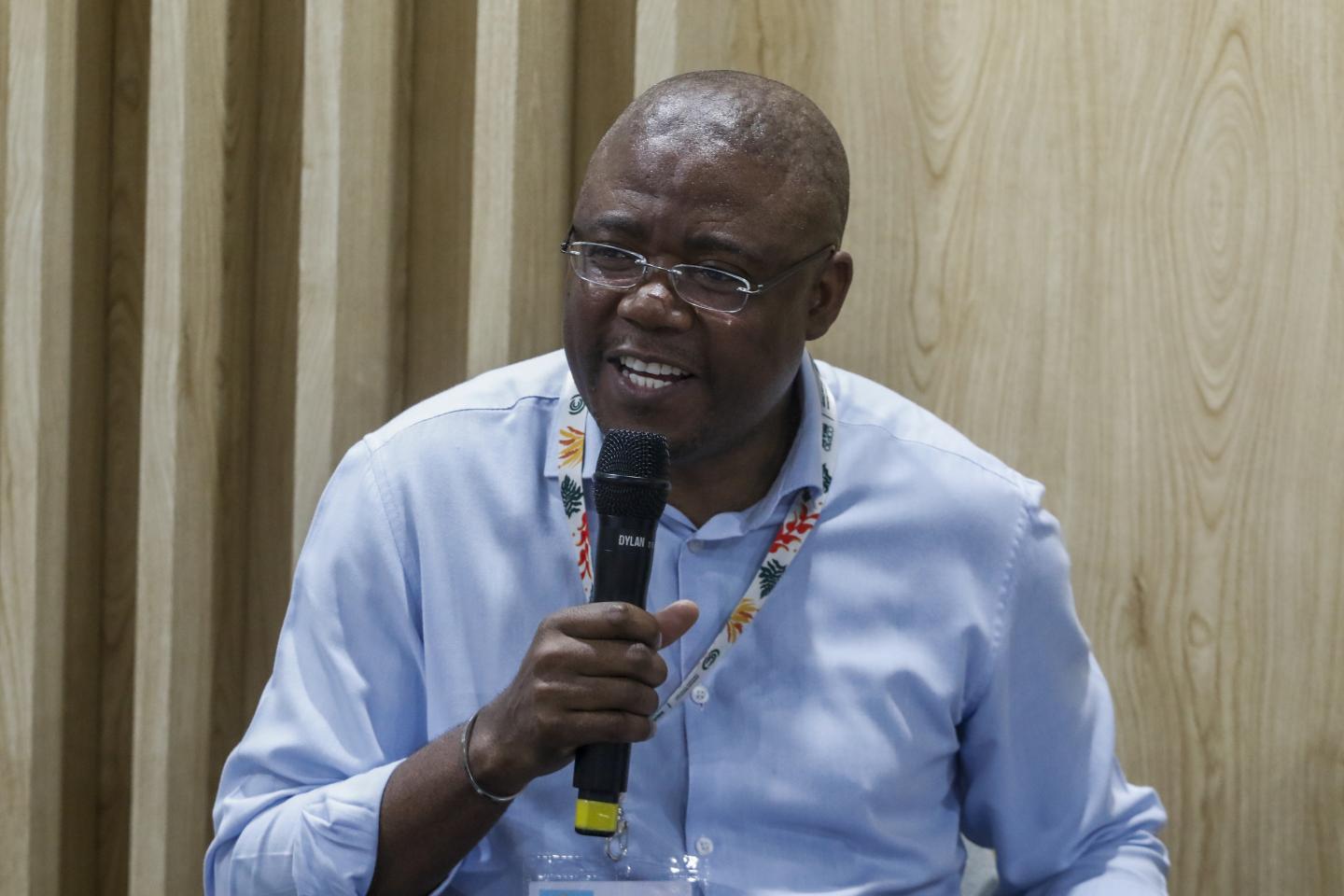Belém, Brazil – At the UN Climate Change Conference – COP30, the Global Accelerator on Jobs and Social Protection for Just Transitions highlighted the role played by social protection and decent job creation in ensuring a just transition, for people and the planet. The session, “Just transitions: investing in people to succeed in the ecological transition – pathways for renewed cooperation,” brought together governments, public development banks (PDBs), civil society, and international organizations at the French Pavilion on 15 November, to explore practical levers for a just and inclusive transition, by prioritizing social and economic development alongside ambitious decarbonization policies.
National representatives from Mexico’s Ministry of Environment and Natural Resources and South Africa’s Development Bank of South Africa (DBSA) presented their own challenges and opportunities in designing transitions that work for people and the environment. Agence française de Développement (AFD) highlighted the central role of public development banks in directing financing not only toward emissions reduction, but toward decent job creation, skills development, and expanded social protection. These elements are essential to ensure that workers and vulnerable communities can transition to new opportunities as economies shift away from fossil fuels.
“Social justice is no longer an option for us; it is a prerequisite for the success of the projects we support. In our new “Planet” roadmap for 2025-2030, we reconcile climate, nature, and development by systematically integrating social and inequality issues,” explained Ms Audrey Rojkoff, AFD Head of Climate and Nature Division.

AFD and the Council of Europe Bank (CEB) are co-leading the Finance in Common Summit’s (FICS) Coalition for Social Investment (C4SI), which has since 2024 created a working group on “Harnessing the social impact of PDBs financing for just transitions”.
The International Labour Organization (ILO) is supporting this working group and offering through the Global Accelerator a platform where Public Development Banks can align their investments and pipeline projects to national priorities. These priorities are set in national Global Accelerator roadmaps, which are designed and endorsed by national governments, workers, employers and civil society organizations, aligning just transition efforts with job creation and social protection policies and programmes.
“A just transition for all, decent work creation and social protection are not only co-benefits – they are the enablers of ambition both for mitigation and adaptation. As such, the objectives of a just transition and social justice must be at the beginning, not the end of the process”, Mr Moustapha Kamal Gueye, Director, Action Programme on Just Transition, ILO.

During the event, the representative of Caritas Brazil highlighted the importance of community-driven solutions that protect livelihoods and ensure equitable access to resources. Mr Lucas D’Avila, Advocacy Officer, Caritas Brazil, stated, “A just transition begins with people — especially those at the margins. By valuing traditional knowledge, ensuring accessible financing, and building participatory governance, local pathways can catalyze wider transitions with real impact. And to reach this, strong dialogue between civil society, governments, international organizations, and development institutions is essential for linking these efforts and sustaining this transformation.”
"Country platforms helped to lay institutional, strategic, and programmatic foundations for a Just Energy Transition that is people centred. The next step is scaling execution — with long-term affordable finance, and with deep partnership across public development banks, labour, communities, and the private sector. If done properly, the transition will yield the double dividend of reducing emissions; and building a dignified economy," stated, Mr. Zeph Nhleko, Chief Economist, Development Bank of Southern Africa, South Africa
Global Accelerator roadmaps have already been endorsed by several countries, including Albania, Bhutan, Cambodia, Indonesia, Malawi, Paraguay, and Uzbekistan, with measures supporting climate mitigation and adaptation playing a critical role in several of them. In the Philippines, for example, the roadmap focuses on construction and transport — two emissions-intensive sectors with high informality and vulnerability to climate impacts. Policy reforms will centre on reskilling workers, extending social protection, and improving occupational safety and health.
The panel underscored that no transition will succeed unless it is just — rooted in human and labour rights, decent work, institutional coordination, and social investments that are measurable, financed, and governed with participation.